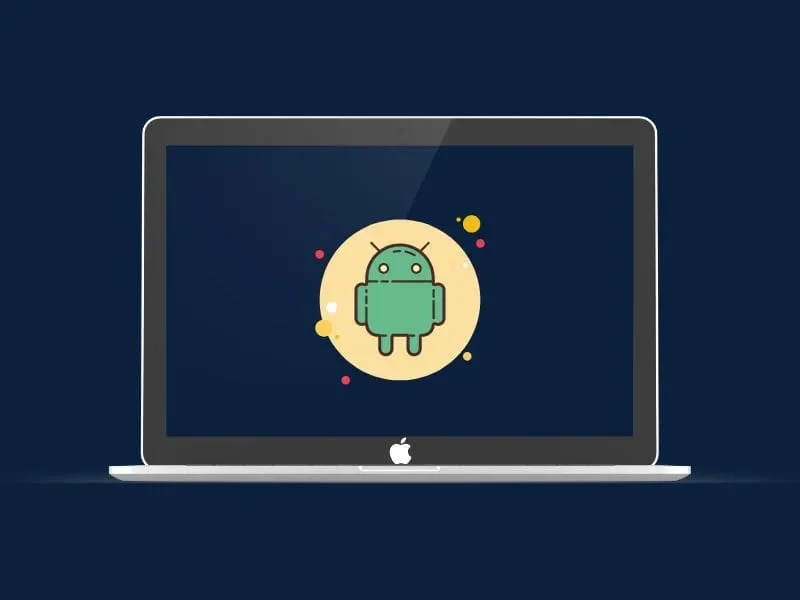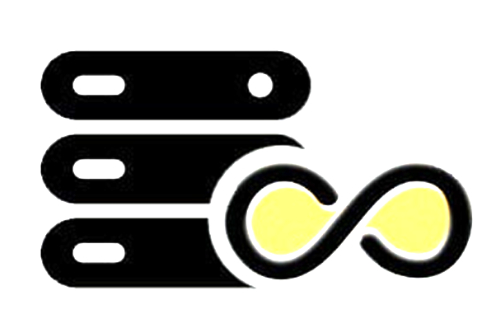Optimizing Gaming Performance: Unleash Android Emulator Potential on Budget PCs

Emulators, whether hardware or software-based, provide users with the capability to execute applications or operate devices without the necessity for physical interaction. One might question the need for an emulator when it’s possible to install any program directly on an existing operating system. The rationale behind leveraging emulators lies in optimizing performance. Regardless of the robustness of an operating system, it has its constraints. Emulators come into play to alleviate the burden on your system, ensuring seamless performance. Furthermore, they serve to bridge compatibility gaps, allowing users to utilize applications that might otherwise be incompatible with their native OS.
In essence, emulators serve as valuable tools for enhancing system performance and expanding compatibility, offering users a versatile approach to running applications and devices efficiently.
Jump To...
Comparison between Emulator and Virtual Machine (VM)
It’s essential to differentiate between emulators and virtual machines (VMs). Emulators function autonomously, placing less reliance on CPU capacity and thereby minimizing performance impact. On the other hand, VMs necessitate CPU virtualization features for operation, establishing direct interaction with your hardware to create isolated environments.
The distinctive feature of emulators lies in their versatility, enabling the creation of multiple virtual environments, each capable of running on different operating systems. This sets emulators apart from VMs, which are designed for entirely different purposes.
Use Cases of emulators
Emulators have a wide range of applications, spanning from replicating hardware devices like printers to running software that is incompatible with your operating system—such as console-based games or legacy applications. Consider the scenario of having a Windows OS but requiring Linux applications; an emulator effortlessly bridges this compatibility gap.
Moreover, emulators are a boon for developers. They serve as invaluable tools for software testing and compilation across diverse operating systems, allowing developers to work concurrently on Linux, Windows, and macOS. This flexibility streamlines the development process, making emulators an essential asset in a developer’s toolkit.
Exploring New Horizons with Android Emulators

Transform your computer into an Android application powerhouse with an emulator. This versatile tool is especially valuable for gamers and developers, ensuring seamless Android app execution.
How does an Android emulator designed for low-end PCs operate?
Many Android emulators designed for low-end PCs leverage QEMU (Quick EMUlator) to emulate a variety of operating systems and programs. QEMU, an open-source virtualization software, plays a key role in facilitating the emulation process. To enhance the experience, it’s crucial to ensure that the specifications of your guest device align with the infrastructure architecture of your PC. This optimization ensures a smoother and more efficient emulation process for optimal performance on low-end hardware.
Essentials for Running an Android Emulator on Low-End PCs
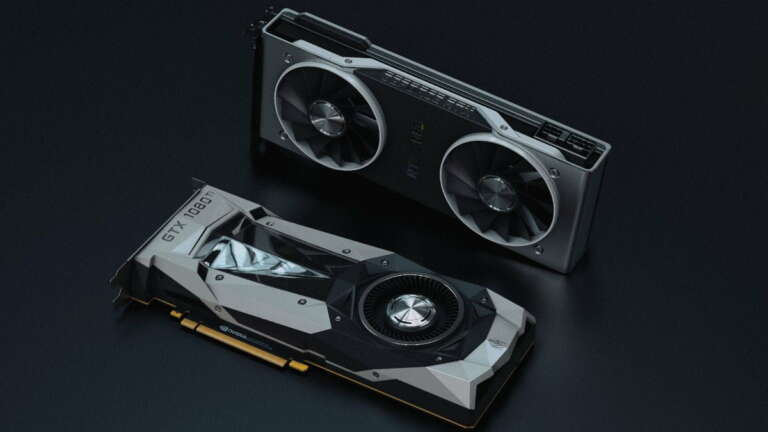
While these aren’t minimum requirements, they ensure optimal performance:
OS: 64-bit Windows, Mac OS, Linux
RAM: 4GB-8GB
Disk Space: 16GB
A dual-core CPU with basic virtualization technology
Display with minimum resolution support of 1280 x 800
Presenting the Top Lightweight Android Emulator
Turning our attention to the core of this blog, let’s delve into the optimal emulator for low-performance PCs. Initially, let’s establish the criteria that characterize a low-end PC.
What constitutes a low-end PC?
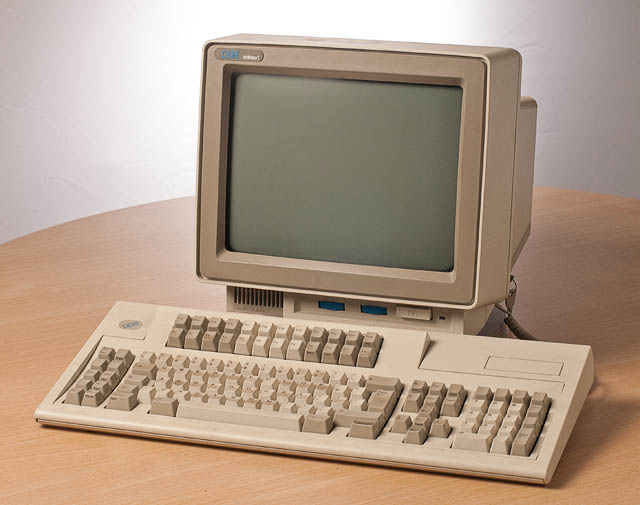
A low-end PC is often characterized by minimal components, such as 4GB of RAM, 256GB of storage, and a Ryzen 3 or i3 processor, without a dedicated graphics card. Despite their modest specifications, these PCs can be effectively enhanced and utilized as efficient devices with the appropriate emulator.
Best Android Emulators for Low-End PCs
Now, let’s explore the optimal lightweight Android emulator tailored for your low-end PC.
BlueStacks: Your Gateway to Android Gaming
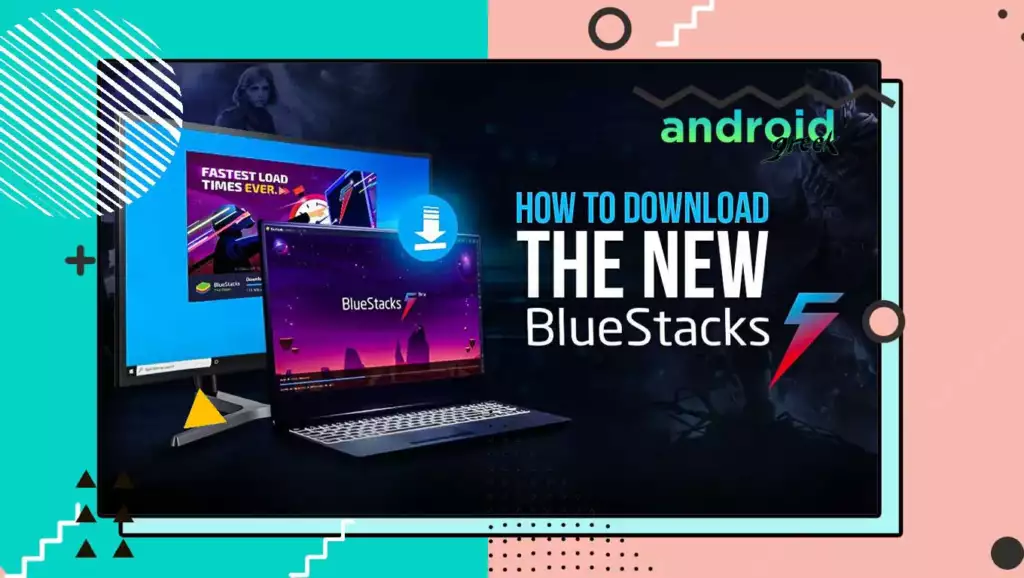
Supported Platforms: Windows and macOS
Price: Lifetime Free
Link: BlueStacks
BlueStacks, developed by now.gg, Inc., proudly holds the position of the world’s #1 App Player for PC and Mac, with a special focus on catering to gamers. It boasts exceptional performance, precise game controls using a keyboard, mouse, or controller, and a myriad of game-specific customizations aimed at elevating your gaming experience.
Key Features of BlueStacks:
Play multiple games simultaneously
Supports Android 11
Real-time action recording and replay
Native Controller Support, Performance Modes, Memory control, and more
Offers up to 240 FPS gameplay
Compatible with Windows 10, Windows 11, and Mac
Game Recommendations: Clash of Clans, Genshin Impact, MARVEL Strike Force, and more.
Minimum System Requirements for BlueStacks:
Up-to-date graphics drivers
Microsoft Windows 7 and above
Minimum 4GB RAM
Minimum 5GB Free Disk Space
Customer Support: Reach out via email, chat, Reddit, Discord, and social media channels.
Pros of BlueStacks:
Run almost all Android apps
Integrated Play and Win for exciting rewards
User-friendly interface
Supports multiple instances and accounts
Cons of BlueStacks:
It may not perform well on super low-end PCs
Contains ads (can be disabled)
Embark on a new realm of Android gaming with BlueStacks, offering an unparalleled experience like never before.
Droid4x: Android Games on Desktop
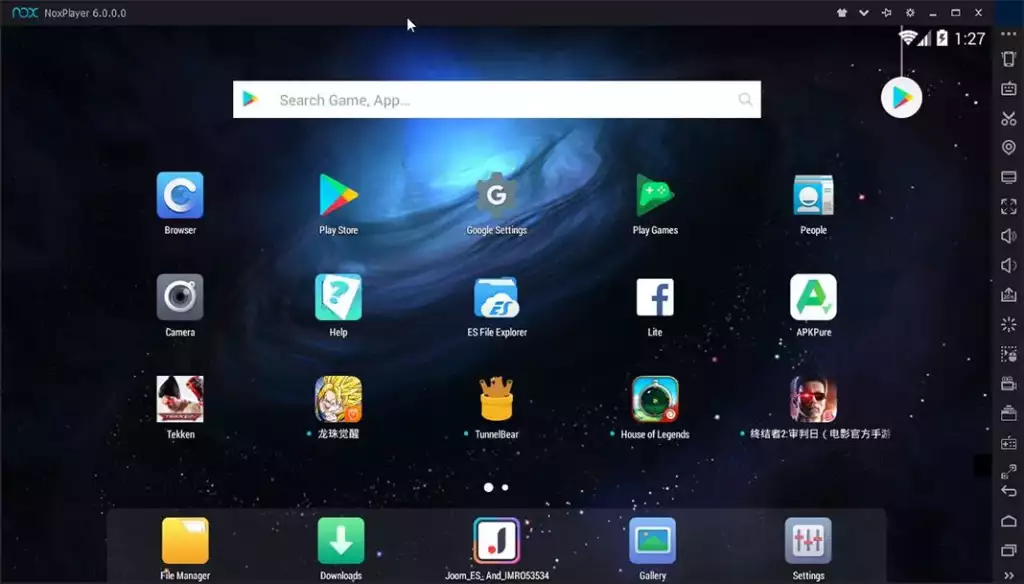
Supported Platforms: Windows
Price: Lifetime Free
Link: Droid4x
Droid4X, a versatile Android emulator crafted for Windows PCs, empowers users to seamlessly run mobile applications and games on their desktops. With its broad game compatibility and a range of customization options, it stands out as an excellent choice for Android enthusiasts.
Key Features of Droid4x:
Complete Android experience on PC
Customizable controls
Built-in video recording
Direct app downloads to the emulator
Game Recommendations: Clash Royale, Subway Surfers, and Candy Crush.
Minimum System Requirements for Droid4x:
Windows 7 or higher
Minimum 2GB RAM
Dual-core CPU
Customer Support: Reach out via email.
Pros of Droid4x:
Smooth performance without lag
Key binding of Gamepad and Keyboard
Responsive framerate for great gameplay
Secure and safe for your devices
Cons of Droid4x:
Gyro sensor compatibility issues
Limited support for widgets
Experience the world of Android apps on your desktop with Droid4x.
LDPlayer: Android Emulation Perfected
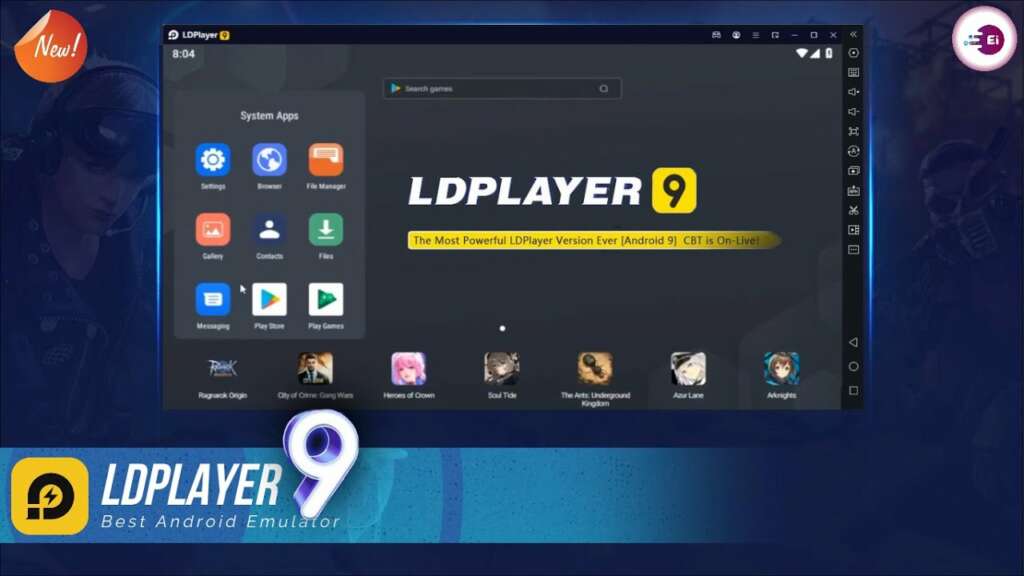
Supported Platform: Windows
Price: Lifetime Free
Link: LDPlayer
LDPlayer revolutionizes Android emulation, providing an optimal platform to fulfill all your Android requirements. Boasting a user-friendly interface and a wealth of features, LDPlayer guarantees a smooth and immersive Android experience on your Windows PC.
Key Features of LDPlayer:
Download Android Games and apps from the LD Store or Google Play
Custom control with keyboard and mouse
Simultaneously run several games
Function Instruction, Virtual Phone Model, Gamepad Support, and more
Game Recommendations: Minecraft, Free Fire, Terraria.
Minimum System Requirements for LDPlayer:
Intel or AMD Processor (x86/x64)
Minimum 2GB RAM
Compatible with Windows XP (SP3), Win7, Win8, Win8.1, and Win10
Customer Support: Assistance is available via email.
Pros of LDPlayer:
Fast execution and lightweight
Regular updates
Easy access to Android shortcuts
Supports resource allocation
Cons of LDPlayer:
Audio quality may be subpar
Performance issues in intensive games like PUBG mobile
Discover LDPlayer for an unparalleled Android emulation experience on your Windows PC.
Ko Player: Lag-Free Android Gaming
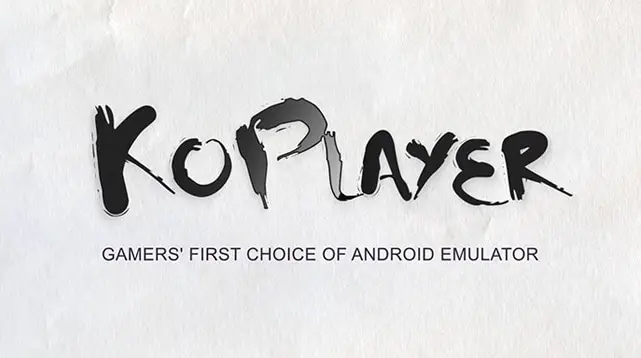
Supported Platforms: Windows and Mac
Price: Lifetime Free
Link: Ko Player
Ko Player, a specialized Android emulator tool, ensures a lag-free Android gaming experience on both Windows PC and Mac. With its straightforward design, user-friendly interface, and ease of use, it stands out as an excellent choice for gamers.
Key Features of Ko Player:
Complete Android experience on PC
Simple and interactive user interface
Built-in video recording and sharing
Inbuilt Google Play Store access
Game Recommendations: Call of Duty, GTA Vice City, Battlegrounds, and more.
Minimum System Requirements for Ko Player:
Dual-core AMD or Intel CPU
HDD – 10 GB of free disk space
Minimum 2GB RAM
GPU with OpenGL 2.1
Resolution – Minimum 1024 X 768
Customer Support: Reach out via email.
Pros of Ko Player:
User-friendly UI and setup
Video recording capabilities
Full access to the Play Store
Cons of Ko Player:
Limited customization options
Focused on usability over advanced features
Indulge in a lag-free Android gaming experience with Ko Player on your Windows PC or Mac.
NoxPlayer: A Gamer's Paradise
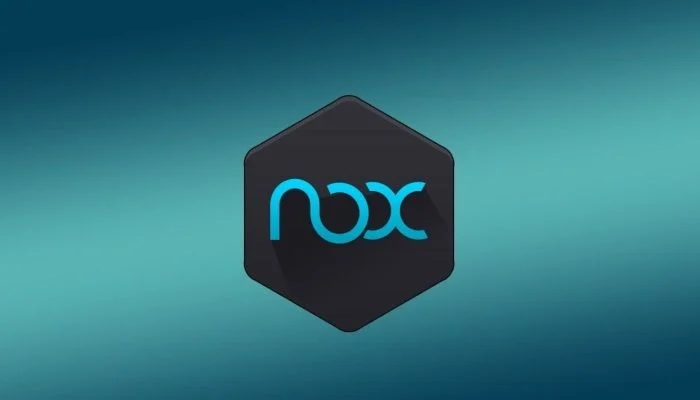
Supported Platforms: Windows and Mac
Price: Lifetime Free Basic Plan
Link: NoxPlayer
Nox Player, hailed by gamers globally, stands out as a versatile Android emulator with the capability to handle multiple functions. With its advanced features including keyboard mapping, gaming controls, and superior performance, it emerges as a top choice for both gamers and developers.
Key Features of NoxPlayer:
Open keyboard mapping with a single click
Default macro recorder for complex operations
Exceptional user experience and performance
Gameplay customization and Screen Recording
Game Recommendations: Mobile Legends, Rules of Survival, Fortnite.
Minimum System Requirements for NoxPlayer:
NVIDIA, Intel, or AMD GPU with OpenGL 2.0 Support
CPU- Any Intel or AMD dual-core CPU.
Minimum 1.5GB RAM
OS- Windows XP service pack 3 or above.
Customer Support: Reach out via phone and email.
Pros of NoxPlayer:
Fast, customizable, and user-friendly
Supports joystick and keyboard
Regular updates and bug fixes
Multi-instances and multiple windows support
Cons of NoxPlayer:
Laggy performance with multiple open windows
Limited security measures
Embrace NoxPlayer for a gaming and development experience that surpasses expectations.
ARChon: Android Apps in ChromeOS
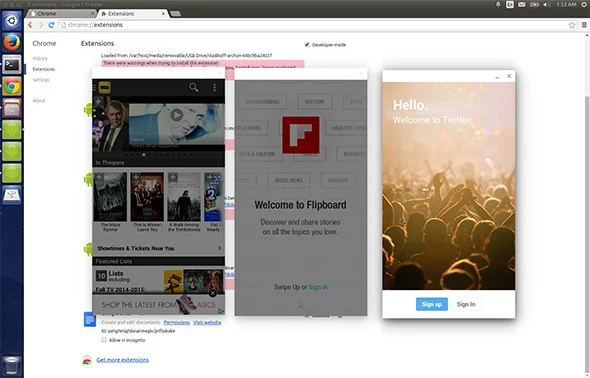
Supported Platforms: Linux and Windows
Price: Open Source Project (Free to Download)
Link: ARChon
ARChon is Google’s App Runtime for the Chrome package, serving as an emulator that enables the running of any Android package as a ChromeOS app. This feature makes it an excellent choice for boosting productivity with the integration of Android apps.
Key Features of ARChon:
Lightweight integration with Google Chrome
Compatible with all operating systems
Supports the latest Android system
Pros of ARChon:
Integrated into Chrome
Lightweight and open-source
Ideal for productivity apps
Cons of ARChon:
Limited developer support
Infrequent updates
Unleash the capability of running Android apps on ChromeOS with ARChon.
Memu: Your Gateway to Mobile Games on PC
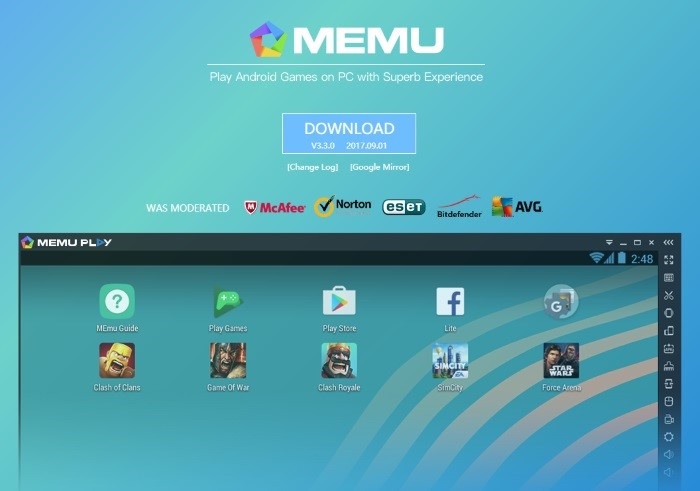
Supported Platforms: Android, iOS, Windows, and Mac
Price: Lifetime Free Basic Plan
Link: Memu
Memu, celebrated for its ease of installation, is a prominent Android emulator known for its compatibility with both Intel and AMD chips, support for integrated and dedicated graphics, and a wide range of keyboard mapping options. It stands as the preferred choice for individuals seeking a smooth and seamless Android experience on their PC.
Key Features of Memu:
Enhanced gaming experience with keyboard mapping
Option for virtualization
Dedicated keyboard settings for fast gaming
New UI design for a better user experience
Game Recommendations: Garena Free Fire, PUBG mobile, Call of Duty mobile.
Minimum System Requirements for Memu:
Latest Graphics driver with OpenGL 2.0
Minimum 2GB RAM
Hardware Virtualization Technology
Runs on Windows 7 or above
Customer Support: Assistance is available through email and contact form.
Pros of Memu:
Custom key mapping feature
Set virtual location on Google Maps
Supports both AMD and Nvidia graphics cards
One-click rooting and APK file installation
Excellent gaming performance
Cons of Memu:
Limited performance on low-end computers
Primarily focused on gaming
Explore Memu for a captivating Android experience on your PC.
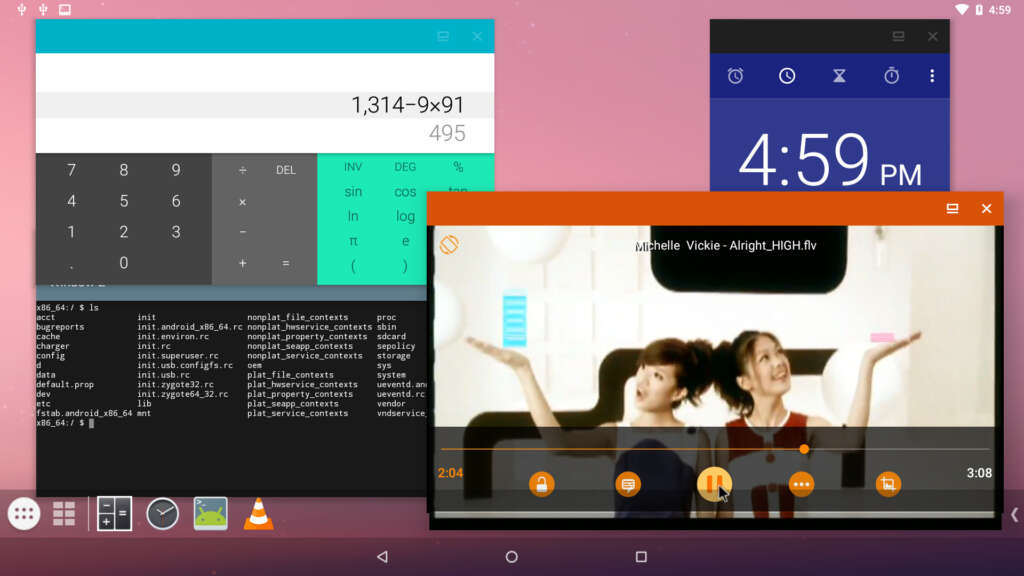
Supported Platforms: Windows
Price: Open Source Project (Free to Download)
Link: Android-x86
Android-x86, licensed under Apache Public License 2.0, stands as an open-source Android emulator. Renowned for its versatility, it provides stable support for various devices and delivers high performance, making it an ideal choice for testing and development purposes.
Key Features of Android-x86:
WiFi support with GUI
Power Suspend/resume (S3 mode)
V4l2 Camera support
Support for native resolution
Mirror mode on external monitors
External storage automount support
Support for external keyboard
Minimum System Requirements for Android-x86:
VT-x or AMD-V
Minimum 2GB RAM
Dual-core 64-bit processor
64MB Intel/NVIDIA/AMD GPU
Customer Support: Reach out via email.
Pros of Android-x86:
Stable support for devices
High performance
User-friendly
Open-source operating system
Cons of Android-x86:
Slower performance
Limited to specific use cases
Delve into the open-source realm of Android emulation with Android-x86.
Genymotion: A Developer's Delight
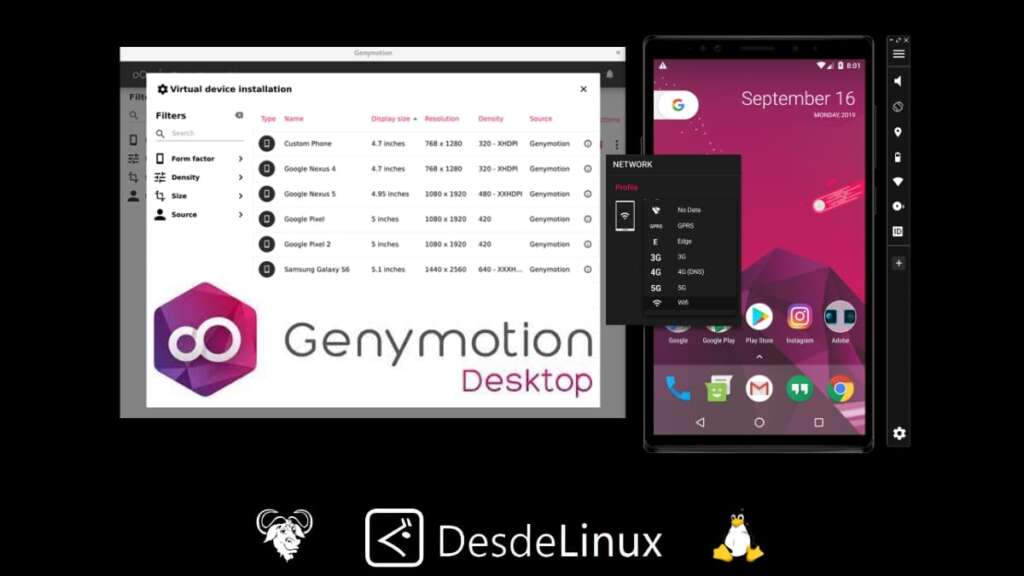
Supported Platforms: Windows, Linux, and Mac
Free Trial: 30-Days Free Trial
Link: Genymotion
Genymotion, a versatile Android emulator with multi-support capabilities, stands as the ultimate tool for developers. It provides high-definition pixel compatibility, extensive Android device emulation, and robust sensor support, making it an indispensable choice for comprehensive testing and development purposes.
Key Features of Genymotion:
High-definition resolution compatibility
Secure virtual environment for testing
Desktop webcam as a video source for screencasts
Emulation of over 3000 Android device configurations
Minimum System Requirements for Genymotion:
Intel Core i5 (64-bit), AMD Ryzen
Microsoft Windows 10
RAM- 16 GB
Free HD Space- 120MB for Genymotion + 1GB per virtual device
Customer Support: Reach out via chat and contact form.
Pros of Genymotion:
Ideal for developers
Supports a wide range of Android versions
Compatible with Android Studio
Extensive library of emulated and custom devices
Cons of Genymotion:
Not suitable for gaming
Lacks Google Play Store
Not as resource-efficient as other emulators
Genymotion empowers developers to effortlessly create and test Android apps.
PrimeOS: The Fusion of Android and PC
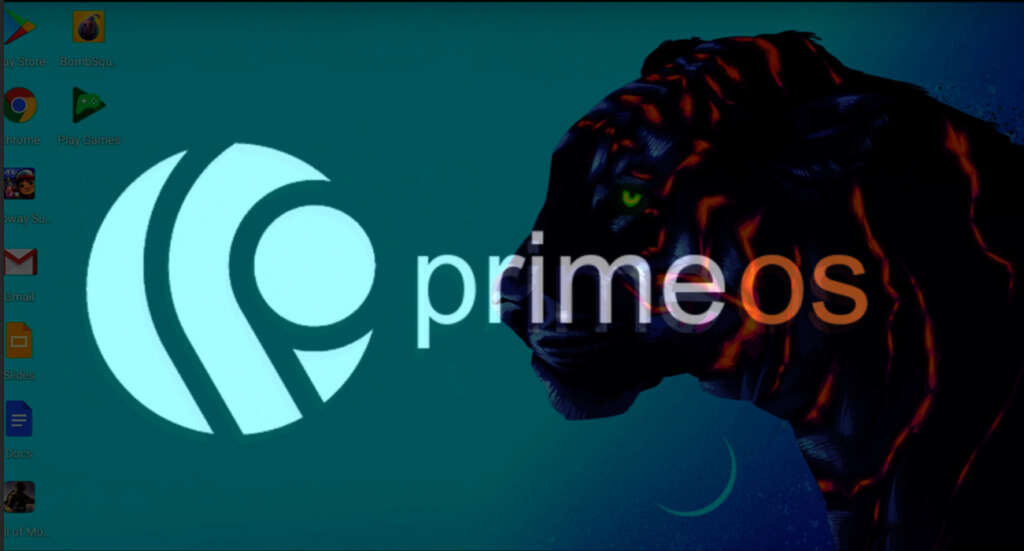
Supported Platforms: Windows
Free Trial: Lifetime Free
Link: PrimeOS
PrimeOS serves as the bridge between Android and PC, delivering a comprehensive desktop experience. It stands as the ideal choice for students, gamers, and anyone seeking the seamless integration of Android and PC functionalities.
Key Features of PrimeOS:
You can easily setup dual boot with a single click
Seamless integration of Android and PC
High performance on budget Windows systems
Minimum System Requirements for PrimeOS:
NVIDIA GeForce – 128 MB VRAM
Minimum 4GB RAM
Intel Core 2 Duo 2 GHz or AMD Athlon.
Customer Support: Reach out via email, phone, chat, and contact form.
Pros of PrimeOS:
Supports multiple windows
Beautiful user interface
Direct hardware integration as a separate operating system
Play Android games on your PC easily.
Cons of PrimeOS:
Advertisements are present
No one-click installation
Limited full-screen support
Immerse yourself in the fusion of your Android devices and PC with PrimeOS, unlocking a versatile computing experience.
Conclusion
In this extensive examination of the best emulators designed for low-end PCs, we’ve uncovered the potential to elevate your modest computer into a gaming and development powerhouse. Whether you’re a gamer aiming to enjoy Android games on a larger screen or a developer seeking to test apps across diverse platforms, selecting the appropriate emulator can be transformative. Assess your specific requirements and opt for the emulator that aligns best with your needs, unlocking a realm of possibilities for your low-end PC.
Frequently Asked Questions
Goal #1: Preserving legacy software
Indeed, one of the primary purposes of using emulators on a computer is to preserve old software. As technology advances, older software programs and games often become incompatible with modern computers. Emulators for PC play a crucial role in bridging this compatibility gap, enabling users to run old software on contemporary technology. This preservation effort allows users to maintain access to and experience priceless relics of the digital past, ensuring that valuable pieces of software history are not lost or rendered obsolete.
Goal #2: Cross-Platform Development
Emulators serve as an invaluable tool for developers, eliminating the necessity for physical devices. By enabling testing across multiple platforms without the need for actual hardware, developers can streamline the development process. This approach allows programmers to identify and address compatibility issues at an early stage, contributing to a more efficient and refined development workflow.
Goal #3: Gaming
Emulators have garnered widespread acceptance and enthusiasm from gamers. These software solutions enable players to experience old console games on their PCs, expanding the gaming possibilities. Emulators offer gamers access to an extensive library of classic games, encompassing titles from platforms like the Sega Genesis and Nintendo Entertainment System (NES), as well as contemporary platforms such as Android and Nintendo Switch. This flexibility provides gamers with the opportunity to revisit or discover a wide range of gaming classics, contributing to the preservation and enjoyment of gaming history.
Smooth Gameplay
BlueStacks significantly enhances the gaming experience by prioritizing smooth gameplay. Tailored specifically for gaming, this emulator ensures that even graphically demanding games run seamlessly, free from latency issues. The design focus on gaming performance makes BlueStacks an optimal choice for gamers, allowing them to enjoy a fluid and responsive gaming experience across a wide range of games.
Customizable Controls
BlueStacks enhances the gaming experience with smooth gameplay, especially for graphically demanding games. Additionally, its configurable controls allow players to use a keyboard and mouse, providing a competitive advantage in many games.
Multiple Instances
BlueStacks allows you to run multiple game instances simultaneously, enabling the use of different accounts or the ability to play several games concurrently. This feature is highly valued by hardcore players who find it particularly beneficial for managing multiple gaming scenarios and accounts simultaneously.
Flexible Resolution
Within BlueStacks, you have the flexibility to adjust the resolution to align with your hardware and personal preferences. This feature enables you to find the optimal balance between performance and visual quality, allowing for a customized and enjoyable gaming experience tailored to your specific preferences and hardware capabilities.
Saving The Cloud
In addition, BlueStacks offers cloud storage, ensuring the safety and accessibility of your gaming data from any location. This feature alleviates concerns about potential hardware issues leading to the loss of gaming progress, providing a secure and convenient solution for preserving and retrieving your gaming data.
Operating System:
Ensure compatibility with your operating system before using an Android emulator. Most emulators are designed for Windows, macOS, or Linux. To obtain precise information on OS requirements, visit the official page of the emulator you intend to use.
Processor (CPU):
A dual-core or more CPU is advised.
Support for Intel VT-x or AMD-V virtualization can greatly enhance emulator performance, but it is not necessarily necessary.
RAM (memory):
While 4GB or more is advised for slicker performance, 2GB of RAM is the minimum needed.
Graphics (GPU):
Your computer should support OpenGL 3.0 or later.
Although dedicated GPUs can perform better than integrated graphics, they are not always necessary.
Storage Space:
Set aside at least 2GB of free space for the Android OS image and the emulator.
An SSD can decrease the loading times and boost overall performance.
Virtualization:
If your CPU (Intel VT-x or AMD-V) supports it, turn it on in the BIOS/UEFI settings. This can improve emulator performance greatly.
Android Emulator Option:
Take into account employing lightweight Android emulator made for budget PCs, such as “Android-x86” or “NoxPlayer.”
Advantages of Droid4X
Droid4X offers several advantages:
High Performance: Even for resource-demanding apps and games, it gives you a fluid and responsive Android experience on your PC.
Simple Installation: Droid4X is simple to install and configure, making it usable by people of various technical backgrounds.
Customizable Controls: You may replicate touch inputs with keyboard and mouse controls to enable accurate game and app interaction.
Screen Recording: Since Droid4X has a built-in screen recording capability, content producers and gamers may easily record their gameplay.
Multi-Instance Support: Droid4X supports running many instances at once, allowing you to run various apps or games at once.
Disadvantages of Droid4X
Droid4X also has some disadvantages:
Resource Intensive: It can be resource-intensive, especially if you don’t have a dedicated graphics card, which could affect how well some older machines function.
No Frequent Updates: Droid4X has not received frequent upgrades in recent years, which might cause compatibility problems with more modern Android applications.
Limited to Windows and Mac: Droid4X is only compatible with Windows and Mac; as a result, it is not compatible with other operating systems.
Lack of Official Support: Users may have trouble locating help or resolving problems since it is not being regularly maintained.
Occasional Bugs: Occasionally occurring glitches and crashes have been reported by certain users, which can interfere with their user experience.
Both Nox and BlueStacks are popular Android emulators for use on a PC to run Android applications and games. Individual tastes and system needs frequently influence which of the two is preferred. Consider the following crucial points:
Performance: Performance varies depending on the specifications of your PC. BlueStacks has been observed to offer somewhat higher performance in terms of running Android applications and games smoothly in some cases. However, Nox is also known to perform well and to be more resource-efficient.
Both Nox and BlueStacks stand out as popular Android emulators for running Android applications and games on a PC. Preferences and system requirements often play a key role in determining which emulator is preferred. Consider the following crucial points:
Updates: BlueStacks and Nox undergo regular updates to enhance speed and compatibility with new applications and games. To ensure the best experience, it’s advisable to keep your emulator up to date by installing the latest upgrades and improvements.
Resource Usage: Nox is commonly believed to use less RAM than BlueStacks, which can be advantageous for users with less powerful PCs. This potential reduction in RAM usage may contribute to smoother performance on systems with limited resources.


